#sherronda j brown
Text
GOT A BOOK REC FOR MY ACES OUT THERE (especially my fellow white aces)
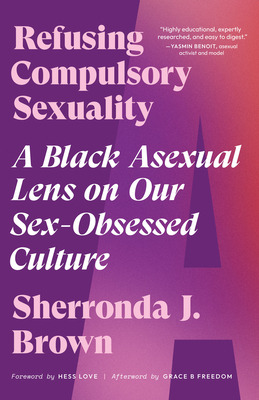
I heard about Refusing Compulsory Sexuality by Sherronda Brown from tiktok, not gonna lie, and I knew I had to read it. I just finished it, and I loved it.
It has a fantastic discussion of asexuality, racism, and sexism (especially the intersection thereof). Sherronda is a wonderful writer and does a great job exploring not only their experience but discussing the history of black people’s sexuality and aceness in a way that is educational and very interesting to read.
It also has a timeline about asexuality dating back to 1855 which I have never seen one that dates back that far before. The amount of research that must have taken floors me, and I love it.
They also sprinkle in really cool tidbits throughout the book that I’m not going to spoil except for my favorite one. Apparently, ace people are 2.4-2.5 times more likely to be left handed than the general population. (And I’m a left handed ace)
I’m hoping to buy myself a copy soon so I can mark it up like I did my copy of Ace by Angela Chen. I checked this out from the library.
So go see if your local library has a copy or if you can buy a copy!
#ace#asexuality#book#booklr#book rec#book review#ace pride#asexual#asexual pride#lgbt#lgbtq#lgbt pride#lgbtq positivity#lgbtqa#sherronda j brown#sherronda brown#book recommendations#book recommendation
1K notes
·
View notes
Text
As with other identity labels, asexual is not prescriptive of behavior; it is a tool. People are free to use the term to help better understand themselves and find community with others who also find the label to be accurate. It is unfortunately quite true that labels can sometimes feel as carceral as they do liberating. But ideas don't put us in a box. Ideas do. For many of us, it is in asexuality that we find the affirmation we have always needed but were never afforded by any other language. We have taken hold of the part of our being, or are we coming, that has long been nameless, and have given it a name.
-Sheronda J. Brown, Refusing Compulsory Sexuality: A Black Asexual Lens on Our Sex-Obsessed Culture
#sherronda j brown#refusing compulsory sexuality#Refusing compulsory sexuality a black asexual lens on our sex obsessed culture#asexual#asexuality#ace stuff#safeforace#queer books#lgbtqia
487 notes
·
View notes
Text
"I knew I was not straight. I had always failed to perform heterosexuality correctly, but I was not evidencing my deviation from heterosexuality in a way that some could recognize as queer enough. And so, what I learned from queer exclusionists is that asexuality will never be loud enough or legitimate enough to be called queer, because queerness is apparently about sex and that fact disqualifies asexuals. I learned that the more pointed terms asexuals use to describe our specific experiences with sex and attraction—like demisexual or aceflux—are just frivolous five-dollar words that mean nothing, excuses wrapped up in a pretty little bow. They taught me that asexuals are liars, just making shit up, vying for special snowflake recognition. Some even informed me, without further explanation, that asexual just means 'a sexual predator.' Among straight people, I was too queer. But to queer exclusionists, I was not queer enough. So there I was. Floating on a lonely island between two worlds, an illegitimate unwelcome child in both.
I had always understood queer to mean existing outside of traditional, rigid ideals of what normative sexuality and gender look like. But what I learned from trying to engage in queer spaces while ace was that, next to trauma and discrimination, many queer people center sex in their queerness and conceive of sex acts as the catalysts for queerness itself. And if that’s where queerness was located, and could only be located according to some, then where did that leave me? I wasn’t fucking back against heteropatriarchy, and what’s so radical about not fucking back? What’s so queer about not fucking, not dating, not loving in the way that society pedestals as the most significant?"
-Sherronda J. Brown, Refusing Compulsory Sexuality
45 notes
·
View notes
Text
Hey have you guys read "Refusing Compulsory Sexuality; A Black Asexual Lens on Our Sex-Obsessed Culture" by Sherronda J. Brown, I really think you should read "Refusing Compulsory Sexuality; A Black Asexual Lens on Our Sex-Obsessed Culture" by Sherronda J. Brown
#please you guys it's very informative#asexual#it's also very inclusive of trans people please you guys please#queer#lgbtq#sherronda j brown
18 notes
·
View notes
Text
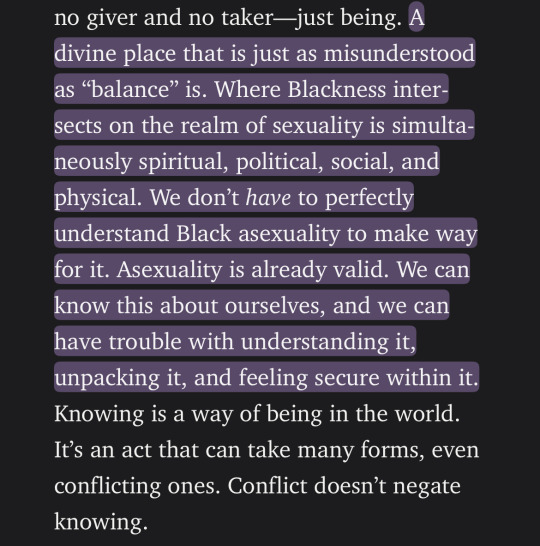
“A divine place that is just as misunderstood as “balance” is. Where Blackness intersects on the realm of sexuality is simultaneously spiritual, political, social, and physical. We don’t have to perfectly understand Black asexuality to make way for it. Asexuality is already valid. We can know this about ourselves, and we can have trouble with understanding it, unpacking it, and feeling secure within it.”
Excerpt From Refusing Compulsory Sexuality: A Black Asexual Lens on Our Sex-Obsessed Culture by Sherronda J. Brown
#pearl reads#asexuality#my goal for 2024 is to read more#at least two books a month#this is my first!#refusing compulsory sexuality#sherronda j brown
5 notes
·
View notes
Text
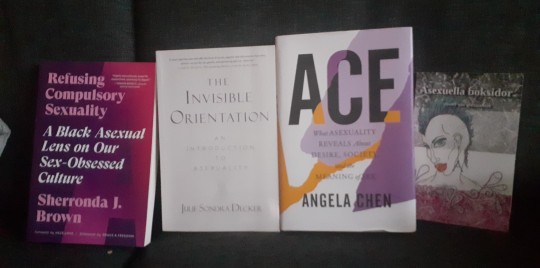

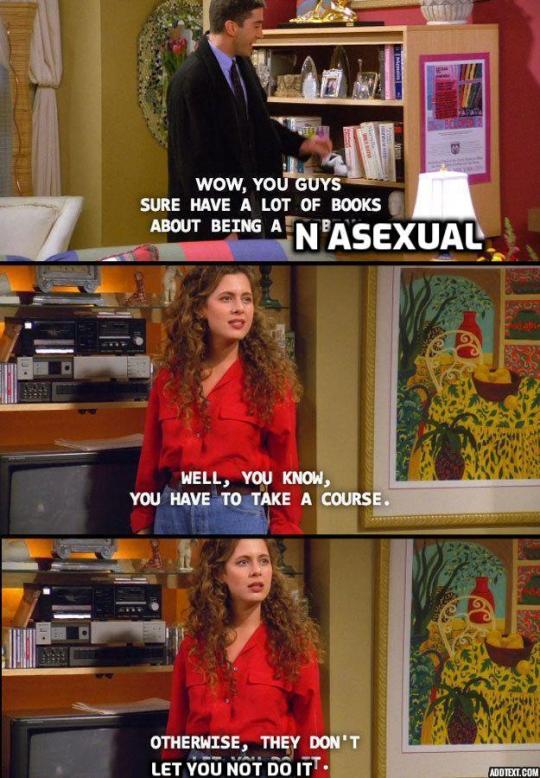
Ace non-fiction
#asexual#angela chen#sherronda j brown#asexuella boksidor#julie sondra decker#the invisible orientation#ace what asexuality reveals about desire society and the meaning of sex#refusing compulsory sexuality#a black asexual lens on our sex obsessed culture#susan bunch#friends meme#english#på svenska
33 notes
·
View notes
Text
https://web.archive.org/web/20221118003654/https://twitter.com/SherrondaJBrown/status/1589378363780911104

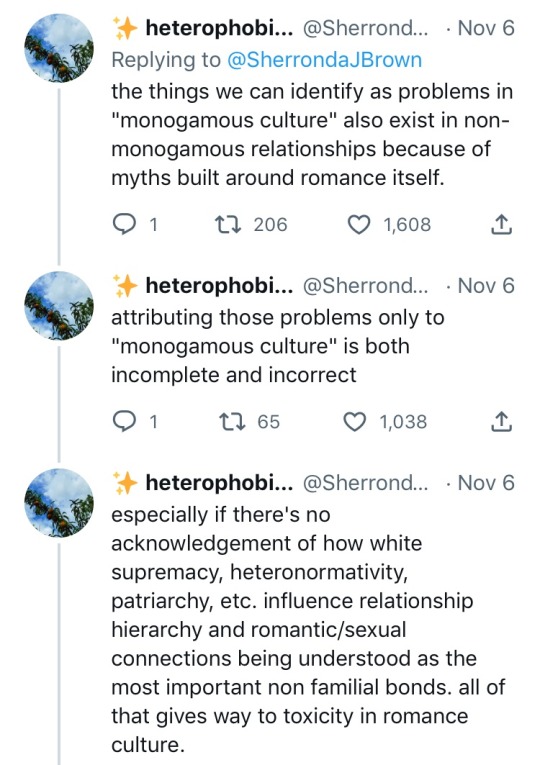

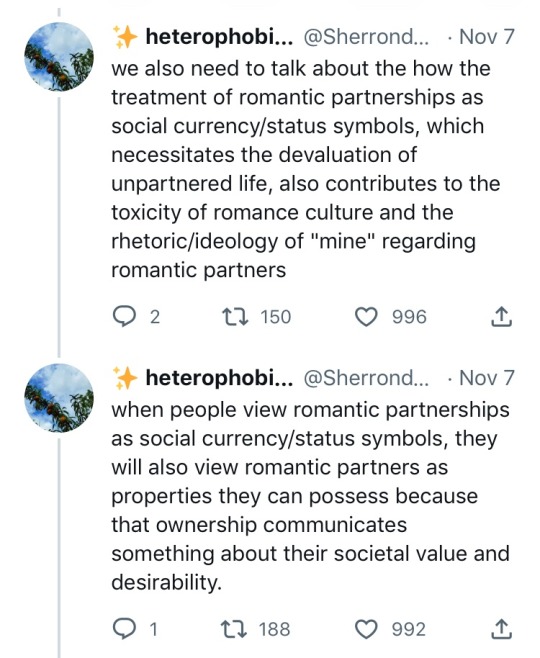
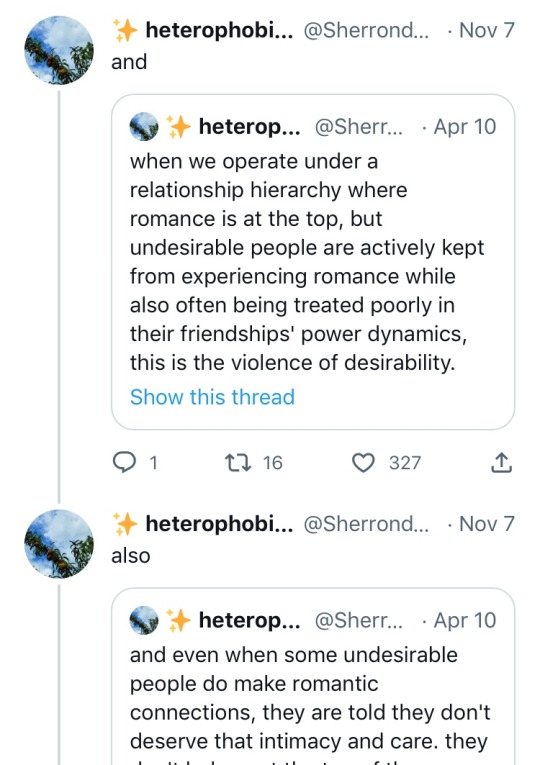

[image ID: twitter thread by SherrondaJBrown from November 6, 2022, that reads,
most critiques of “monogamy culture” don’t go far enough. monogamy is not the problem. a culture of relationship hierarchy with romantic dominance is the problem.
the things we can identify as problems in “monogamous culture” also exist in non-monogamous relationships because of myths built around romance itself.
attributing those problems only to “monogamous culture” is both incomplete and incorrect
especially if there’s no acknowledgement of how white supremacy, heteronormativity, patriarchy, etc. influence relationship hierarchy and romantic/sexual connections being understood as the most important non familial bonds. all of that gives way to toxicity in romance culture.
anyway
also, this is all allonormative culture but that's another twitter rant entirely
we also need to talk about the how the treatment of romantic partnerships as social currency/status symbols, which necessitates the devaluation of unpartnered life, also contributes to the toxicity of romance culture and the rhetoric/ideology of “mine” regarding romantic partners
when people view romantic partnerships as social currency/status symbols, they will also view romantic partners as properties they can possess because that ownership communicates something about their societal value and desirability.
and
quote tweeted:
when we operate under a relationship hierarchy where romance is at the top, but undesirable people are actively kept from experiencing romance while also often being treated poorly in their friendships’ power dynamics, this is the violence of desirability.
also
quote tweeted:
and even when some undesirable people do make romantic connections, they are told they don’t deserve that intimacy and care. they don’t belong at the top of the relationship hierarchy because it’s reserved for desirable people. it’s social currency, and it's not for undesirables.
as always, if you think i’m implying anything i didn’t write in this thread, i’m not.
but also, this short twitter thread is not going to address every single aspect of our culture that contributes to this. that would require an entire book that a lot of people would refuse to read anyway.
/end image ID]
12 notes
·
View notes
Text
5 Nonfiction Books By Black Authors to Read this Month
It’s Black History Month, and while we love to celebrate Black authors all year round, it’s always fun to have an opportunity to talk more about authors that I love. Today, I’m bringing you a list of five of my favorite nonfiction books by Black authors that I’ve read in the past year. These vary in genre—there’s a couple of memoirs and a couple of educational nonfiction books here—but all are…

View On WordPress
#akwaeke emezi#all boys aren&039;t blue#black authors#black history month#by Jocelyn#chrissy king#dear senthuran#george m johnson#quietly hostile#refusing compulsory sexuality#samantha irby#sherronda j brown#the body liberation project
0 notes
Note
"I wish more aro or ace books were good" REAL. I'm not a huge reader these days (a victim of the "read several books a day as a kid to easily distractable ADHD adult" pipeline :/, I'm working on it though) but I stick to mostly nonfiction when I do read, because most fiction is too amatonormative for my tastes and most aspec fiction is. Well. I already struggle with reading books, I need to be able to actually get into them to have a hope of finishing them.
The biggest mood there. Kinda all of it :') Reading books takes so much longer and more Effort than it used to when I inhaled books when I was 12... and SO many books that market themselves on the Aro or Ace Rep are just. They just aren't good books. Most aren't Morally Objectionable or anything, they're just not good books.
I feel like it's normal growing pains for a Queer Identity... god knows how many books I read of high schoolers going "It's okay... to be gay, actually!" when I was in middle/high school--but I kind of wish we could hurry up to the point where there are plenty of good ace and aro ones to choose from. (There are some good ones! The Murderbot Diaries, Ancillary Justice, Michelle Kan's novelettes, Polenth Blake's work, Darcie Little Badger's entire ouvre... I love those. And I haven't read The Bone People but it won a bunch of Real Literary Awards, and Firebreak I've been told is really up my alley... but I have. also read a bunch of aro and ace books that were just mediocre-to-bad.)
#asks#astriiformes#always on the lookout for recommendations of things that people Read And Liked not just found on a list#also for nonfiction: Sherronda J. Brown's 'Refusing Compulsory Sexuality' is SO good. Particularly asexual focused but from an aro-ace POV#and it's Really Good#books
26 notes
·
View notes
Text
Happy International Asexuality Day 2023!
Happy International Asexuality Day! Today we’re celebrating books with main characters all along the ace spectrum, so check out these titles and find your perfect next read! As usual, all links are affiliate and earn a percentage of income for the site, so please use them if you can!
Please note this roundup only features titles that were not previously featured [with covers] in past…
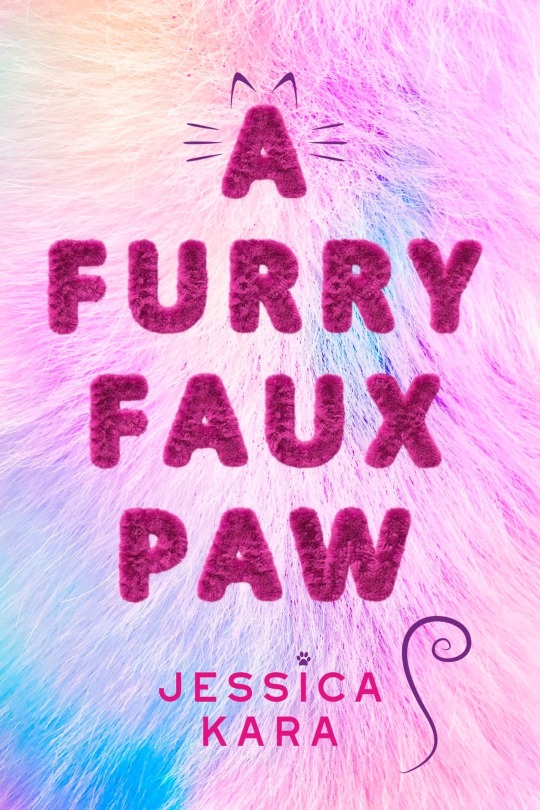
View On WordPress
#Ace-Spec#Ann Zhao#Anna Zabo#Asexual#Asexuality#Dear Wendy#Emma K. Ohland#Here Goes Nothing#Jax Meyer#Just Lizzie#Karen Wilfrid#Love Letters for Joy#Maggie Tokuda-Hall#Racquel Marie#Refusing Compulsory Sexuality: A Black Asexual Lens on Our Sex-Obsessed Culture#Rising from Ash#Sherronda J. Brown#Wren Martin Ruins it All#You Don&039;t Have a Shot
70 notes
·
View notes
Text
When sex is compulsory, it fosters the sense that we are each duty-bound to consistently engage in a certain arbitrary amount of sexual activity—regarding it as something that should be weighed, measured, and quantified, rather than an experience that people should engage in only when all involved have the desire and ability to do so, regardless of how frequent or infrequent that may be. Removing it from the center and the pedestal in our relationships—or, in some cases, our mere existence—would better serve everyone, not only asexuals.
Sherronda J. Brown, Refusing Compulsory Sexuality: A Black Asexual Lens on Our Sex-Obsessed Culture
32 notes
·
View notes
Text
"Chrononormativity, as asserted by feminist writer Elizabeth Freeman in Time Binds: Queer Temporalities, Queer History, addresses the notion that our lives and the experiences within them are set to unfold in a particular pattern, and this pattern is one that is determined by the social and cultural mandates of the era in which we live. Freeman defines chromonomativity as 'the use of time to organize individual human bodies towards maximum productivity [by which] people are bound to one another, engrouped, made to feel coherently collective, through particular orchestrations of time period.'"
-Sherronda J. Brown, Refusing Compulsory Sexuality: A Black Asexual Lens on Our Sex Obsessed Culture
adding this word to my vocabulary
49 notes
·
View notes
Text
"Most allosexuals don’t understand asexuality. A 2019 Sky Data poll on asexuality found that 53 percent of respondents expressed initial confidence in their knowledge of and ability to define asexuality, but 75 percent of these respondents went on to demonstrate a lack of knowledge about the definition of asexuality and little understanding of asexual people’s experiences with sexual desire. While much of this ignorance can indeed be attributed to lack of education and awareness, the other contributing factor is that many allosexuals impede their own education when given opportunities to learn, closing themselves off from their capacity for imagination and critical thought when asexuality is the topic of discussion, even to the point of refusing to acknowledge allosexual as a term that describes them.
This response to allosexual mirrors the way others have responded to cis in conversations about trans and nonbinary identities, or even how some white people respond to being reminded of their whiteness in conversations about race and racism, and this is exactly why the word allosexual is necessary. Naming non-asexual people as allosexual encourages them to think more deeply about this aspect of their identity, consider its many implications, and reflect on how they move through this world because of it and how that truth impacts others—even, and especially, if it makes them uncomfortable to do this work. It’s a reminder that asexuality exists, and that allosexual is just one identity on the spectrum of sexuality—not the default, neutral, blank-slate, 'normal' identity that some have always assumed it to be. So much so that they feel it doesn’t even need to be named.
I know from personal experience, witnessing, and testimonials that allosexual responses to asexuals and asexuality are typically rife with misunderstanding, bad faith arguments, brick walls, circular logic, denial, and cognitive dissonance. If you’ve never had sex, then you can’t know that you are asexual. If you have had sex, then you just haven’t had enough sex to know what you like yet. But you also can’t possibly be asexual if you’ve had 'too much' sex, especially if you enjoyed any part of it. If you come out as ace before a certain age, then it’s too early to know that about yourself. After a certain age, you’re a fraud because otherwise you would have come out sooner. In these interactions, asexuality is always painted as an impossibility according to whatever realm of logic the deniers decide to argue within at any given moment. The parameters are also subject to change at any time, and only they get to determine what those parameters are and when they are allowed to change, never asexuals."
-Sherronda J Brown, Refusing Compulsory Sexuality
22 notes
·
View notes
Text
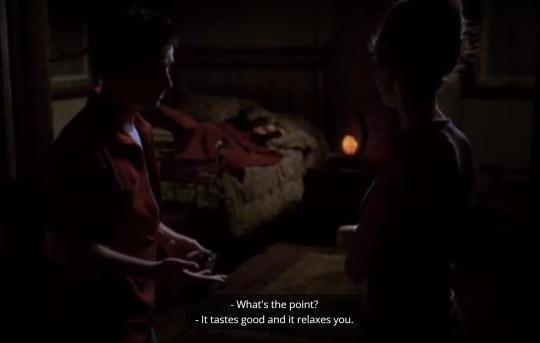

this is the very definition of "if you get me you get me" but this exchange is an ace cordy moment. to me
#buffyverse#angel the series#ifer rambles#thinking about her this ace week......#something something not drinking alcohol as an analogue to asexuality#like i can't relate i drink like a fucking fish but there's Something there#posts that i think sherronda j brown would understand perfectly if they saw my tumblr blog
13 notes
·
View notes
Text
Everything you know about sex and asexuality is (probably) wrong.
The notion that everyone wants sex–and that we all have to have it–is false. It’s intertwined with our ideas about capitalism, race, gender, and queerness. And it impacts the most marginalized among us. For asexual folks, it means that ace and A-spec identity is often defined by a queerness that’s not queer enough, seen through a lens of perceived lack: lack of pleasure, connection, joy, maturity, and even humanity.
In this exploration of what it means to be Black and asexual in America today, Sherronda J. Brown offers new perspectives on asexuality. She takes an incisive look at how anti-Blackness, white supremacy, patriarchy, heteronormativity, and capitalism enact harm against asexual people, contextualizing acephobia within a racial framework in the first book of its kind. Brown advocates for the “A” in LGBTQIA+, affirming that to be asexual is to be queer–despite the gatekeeping and denial that often says otherwise.
With chapters on desire, f*ckability, utility, refusal, and possibilities, Refusing Compulsory Sexuality discusses topics of deep relevance to ace and a-spec communities. It centers the Black asexual experience–and demands visibility in a world that pathologizes and denies asexuality, denigrates queerness, and specifically sexualizes Black people.
#Refusing Compulsory Sexuality#Sherronda J. Brown#adult books#essays#asexual#ace rep#asexuality#compulsory sexuality#black rep#poc rep#daily book#nonfiction#lgbt nonfiction#lgbtqia#bookblr
14 notes
·
View notes
Text
last book read + last stethoscope used, part 4
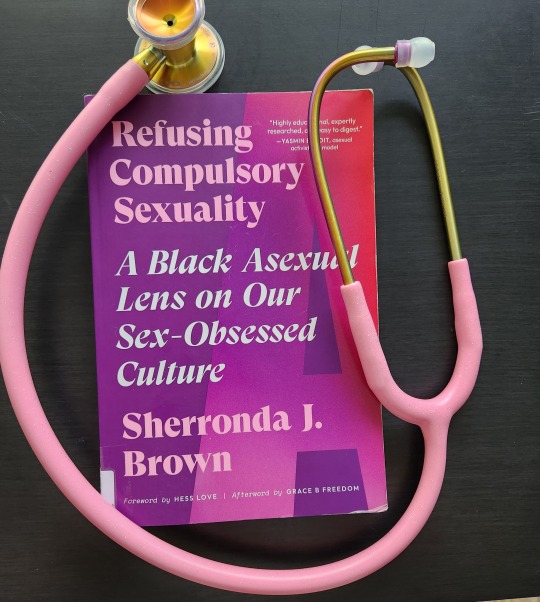
I was planning to post this later, but then I remembered that it's International Asexuality Day! :D
The stethoscope: MDF Procardial Titanium Cardiology scope in light pink glitter and kaleidoscope
The book: Sherronda J. Brown’s Refusing Compulsory Sexuality: A Black Asexual Lens on Our Sex-Obsessed Culture. Brown opens with a Toni Morrison quote: “If there’s a book you want to read, but it hasn’t been written yet, then you must write it.” I admire Brown for doing just that. As far as I know, there is nothing else out there like this book, and it’s both a long time coming and far ahead of its time. How many people are ready to talk about the asexual experience for Black Americans? That’s truly a rhetorical question that I'm not qualified to attempt to answer anyhow, since I'm white. I’ve never seen someone put into words how a combination of anti-Blackness, capitalism, white supremacy, patriarchal attitudes, and heteronormativity work together to make understanding, disclosing, describing, and living one’s ace identity that much more difficult. I only have to battle some of those. I will admit that I was disappointed with Brown’s academic style of writing—I was hoping for something more casual, maybe memoir-esque. That said, there’s an (all too brief) section in the back with quotes from black aces discussing their experiences. She devotes an entire chapter to others’ speculations about the identities of Langston Hughes and Octavia Butler, and implications of the assumptions made about them. I’m not sure about an entire chapter on that subject, but I’m always happy to read anything about Octavia Butler, so her inclusion was a nice (and fitting) surprise.
#books#reading#cardiophilia#cardiophile#MDF stethoscopes#asexuality#international asexuality day#Sherronda J. Brown#Refusing Compulsory Sexuality#heteronormativity#racism#anti-Blackness#asexual literature#asexual reads#lgbtq#lgbtq+#lgbtqia#black asexuality#stethoscopes#lbls
8 notes
·
View notes